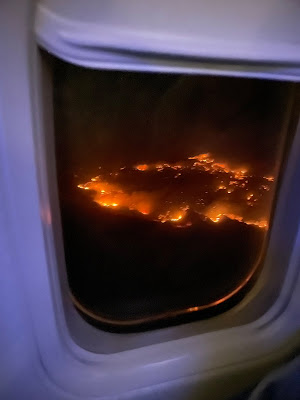 |
| Reporter Anna Padilla of television station KRQE in Albuquerque posted this photo on Twitter last week from a plane window on approach to the city's airport. Widespread wildfires were visible below. |
We shouldn't be seeing so many large and frequent wildfires this time of year in the Southwest, southern Rockies and Plains States. You almost always see some activity in the late winter and spring, but nothing like this.
New Mexico is already seeing its second largest wildfire in history with what is called the Calf Canyon fire near the small city of Las Vegas, New Mexico, about 120 miles northeast of Albuquerque. The Washington Post reports no deaths in the fire so far. But it has destroyed no fewer than 276 structures and force the evacuation of 13,000 people.
Wildfires in New Mexico as of late April this year burned more acreage than scorched in the entirety of seven of the past eight years, says CNN.
The favorable conditions for fires in the Southwest and Plains has cycled repeatedly since at least February from somewhat elevated for a few days during periods of lighter winds to critical when winds pick up, heat intensifies and the humidity crashes.
During the lulls, crews begin to get a handle on the fires, only to see them rage out of control again when the high winds and heat hit again.
Parts of the Southwest were at extremely critical fire danger levels again Sunday and Monday, which of course encouraged the fires to worsen. The fire danger is ebbing only slightly today. The weather is forecast to continue to be favorable for fire weather the rest of the week.
Winds will taper off in the region late in the week and into the weekend, which will help slow the spread of fires, but the weather will remain hot and dry.
SIBERIA FIRES
Meanwhile, unseasonable early season heat, dry weather and high winds have launched wildfires much larger than usual for this early in the season.
At least eight people have died in those fires, according to Reuters.
Russian soldiers traditionally helped battle these fires, but they're unavailable, preoccupied by the war Putin started in Ukraine. During particularly bad fire years, people from other nations, like Poland, would sometimes help with Russian fires. That's not going to happen this time.
I know we're all hating on Russia nowadays due to that nation's atrocities in Ukraine. But don't be too quick to get all schadenfreude on them. The fires are belching incredible amounts of smoke already, and they'll probably contribute to another hazy, smoky summer at times even here in Vermont.
Plus, the fires, especially when they encounter peat bogs, release a tremendous amount of carbon dioxide, which will be yet another bit of a contribution to climate change.
VERMONT
Though we're not about to get a huge blaze, the wildfire danger in Vermont and the rest of the interior Northeast is high to very high today.
Here in Vermont, we're in the midst of a long dry spell and with low humidity. We haven't fully greened up yet, so intense sunlight is still reaching the forest floor, drying things out further.
The saving grace is that winds are on the light side, so if a fire starts, it might not spread too fast. It's going to stay quite dry and sunny in Vermont into Saturday before higher humidity and possible showers arrive this coming Sunday.
So, please, no outdoor burning until it rains, and stop throwing those ciggies from the car windows, please!

